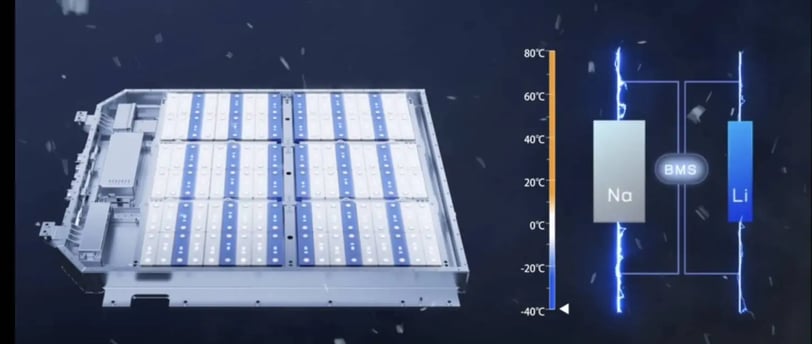Add your promotional text...
The Next Big Revolution in Energy Storage: Are Sodium-Ion Batteries the Future?
Synopsis: As the world transitions towards sustainable energy, sodium-ion batteries are emerging as a cost-effective, eco-friendly alternative to lithium-ion technology. This comprehensive blog explores their potential, the challenges they address, and five pioneering companies positioned to lead this transformative shift in energy storage.
INVESTMENT IDEAS
By Runjhun Tripathi
12/27/20243 min read


A New Era in Energy Storage
The global focus on sustainability and renewable energy is driving innovation in energy storage solutions. Among these, sodium-ion batteries are gaining traction as a promising alternative to lithium-ion batteries. With abundant raw materials, reduced costs, and enhanced safety features, sodium-ion batteries could revolutionize the energy storage industry.
This blog delves into why sodium-ion batteries are touted as the future of energy storage and highlights five companies poised to benefit from this technological shift.
Why Sodium-Ion Batteries?
Sodium-ion batteries offer several advantages over traditional lithium-ion batteries:
Abundant Raw Materials: Sodium is one of the most common elements on Earth, reducing dependency on scarce resources like lithium and cobalt.
Cost Efficiency: The widespread availability of sodium translates to lower production costs.
Eco-Friendly: Sodium-ion batteries have a smaller environmental footprint, aligning with global sustainability goals.
Improved Safety: They are less prone to overheating and pose lower risks of fire, enhancing their appeal for large-scale applications.
These advantages position sodium-ion batteries as a game-changer in industries like electric vehicles (EVs), renewable energy storage, and consumer electronics.
5 Companies Driving the Sodium-Ion Revolution
1. KPIT Technologies
KPIT Technologies is at the forefront of innovation in mobility and clean energy solutions. The company launched India's first sodium-ion battery in December 2023, showcasing faster charging capabilities and an extended lifespan.
Key Financials:
Revenue growth: 23.5% (H1FY25)
EBITDA margins: 20.8%
Diversified revenue streams from software, middleware, and cloud-based services.
KPIT’s pioneering efforts in sodium-ion battery trials underscore its commitment to advancing sustainable energy solutions.
2. Tata Chemicals
As a global leader in specialty chemicals, Tata Chemicals is well-positioned to pivot into sodium-ion battery production. The company’s expertise in soda ash production—a key component for battery materials—gives it a strategic advantage.
Key Highlights:
Third-largest soda ash producer globally.
Significant involvement in the Tata Group’s $1.6 billion EV battery project.
With a robust global footprint and a diversified portfolio, Tata Chemicals is a key player in the sodium-ion battery market.
3. HEG Ltd
HEG is renowned for its expertise in graphite electrodes, a critical component for batteries. The company is exploring applications in sodium-ion battery technology to capitalize on the growing demand for advanced energy storage solutions.
Key Financials:
Manufacturing capacity: 100,000 tonnes per annum.
Export markets: 35 countries.
HEG’s technical expertise and global reach make it a significant contributor to the sodium-ion battery ecosystem.
4. Gujarat Fluorochemicals Ltd (GFCL)
GFCL is a leading producer of fluoropolymers and chemicals, crucial for battery manufacturing. The company recently commissioned a battery materials facility, diversifying its portfolio to include electrolytes and cathode active materials.
Key Highlights:
Market presence in Europe, the Americas, and Asia.
Comprehensive product verticals catering to the battery industry.
GFCL’s proactive investments in battery materials position it as a key player in the sodium-ion revolution.
5. Himadri Speciality Chemicals
Himadri Speciality Chemicals specializes in advanced carbon materials and has expanded into battery materials for sodium-ion and lithium-ion technologies.
Key Financials:
Revenue growth: 19.5% (H1FY25).
Major clientele: Apollo Tyres, Vedanta, and National Aluminium Company.
With a strong domestic market presence and a growing export footprint, Himadri is well-equipped to capitalize on the sodium-ion battery boom.
Challenges and Opportunities
While sodium-ion batteries offer numerous advantages, challenges like energy density limitations and the lack of established infrastructure remain. However, ongoing research and development efforts by these companies are addressing these issues, paving the way for widespread adoption.
Investors and stakeholders should monitor these companies closely, as their innovations could redefine the energy storage landscape.
Shaping a Sustainable Future
Sodium-ion batteries represent a transformative shift in energy storage, offering a sustainable and cost-effective alternative to lithium-ion technology. Companies like KPIT Technologies, Tata Chemicals, HEG Ltd, GFCL, and Himadri Speciality Chemicals are leading the charge, investing heavily in research and development to commercialize this promising technology.
For investors, this is an exciting frontier with significant growth potential. However, as always, thorough research and vigilance are essential to navigating this emerging market effectively.
Disclaimer: This article is for informational purposes only and should not be considered investment advice. Always conduct thorough research and consult with a financial advisor before making investment decisions.
